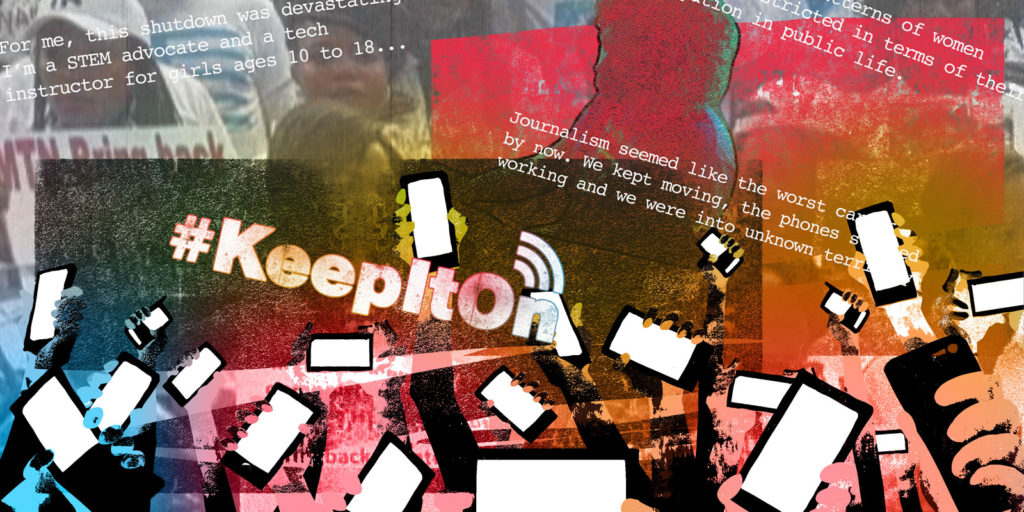This post is part of our new Shutdown Stories series, documenting the impact of internet disruptions on people’s lives around the world. If you have experienced an internet shutdown, please tell us how it affected you.
Cameroon President Paul Biya has been in power for more than 30 years, but he evidently understands the evolution of new communication technology — and fears it. Since October 1st, his administration has undertaken yet another attempt to quell protests in Cameroon’s Anglophone (English-speaking) Northwest and Southwest regions by interfering with internet communications, this time by cutting access to widely used communication platforms such as WhatsApp and Facebook Messenger. The protesters are demanding an end to discrimination and marginalization by Cameroon’s Francophone (French-speaking) majority. Cameroon’s constitution guarantees equal status for the both linguistic groups, but in practice, the government imposes French through courts, schools, and other public institutions.
This is the second time the government has ordered a shutdown this year, and it’s happening even after an official explicitly promised not to interfere with internet access. Worse, Amnesty International is reporting that the military has killed at least 20 people so far during this period of civil unrest. This is another demonstration that internet shutdowns do not restore order, keep people safe, or protect rights. They obscure human rights violations and make it harder to document and share the facts. Three brave people in Cameroon used our Shutdown Stories form to tell us what is really going on under the cover of the shutdown.
“I’m unable to reach my relatives, who are fleeing from their home.”
@AdeolaFayehun this is what is happening as internet shutdown again in #SouthernCameroons #Cameroon pic.twitter.com/9WU2fqiBSp
— prowallace (@wallace51259331) October 2, 2017
Myra is a 26-year-old businesswoman who took care in writing her story, but didn’t want to share her last name or a photo. Reading her story, it’s not hard to guess why:
“I’m unable to reach my relatives. They last contacted me on the 1st of October to say they were fleeing our home in Bamenda. The Cameroon military forces invaded our family home and started beating, shooting, and maiming people. I am a very compassionate person, and this shutdown has had a big effect on me.”
“We are afraid of losing credibility with our partners and readers.”
 Cameroonian civil society organizations are adept at working creatively under difficult conditions, but the internet shutdown has hit them hard. Paul-Joel Kamtchang told us about the difficulties his team faces at Data Cameroon, which fosters a free society by supporting journalism and open data:
Cameroonian civil society organizations are adept at working creatively under difficult conditions, but the internet shutdown has hit them hard. Paul-Joel Kamtchang told us about the difficulties his team faces at Data Cameroon, which fosters a free society by supporting journalism and open data:
“Our contacts in the Northwest and Southwest regions have not been able to monitor the situation on the ground or report the difficulties journalists are facing. It has been really painful and we are afraid of losing credibility with our partners and readers.”
You can help
Even in countries where not as many people have access to the internet, it’s a vital tool that individuals and organizations rely on to stay in touch with loved ones, build their livelihoods, and engage in democratic discourse. It’s also crucial to the economy and development; shutdowns are causing substantial losses to the economy, a grave injustice in a country where millions live on less than two dollars a day. When a government attempts to quell protests by clamping down on free expression, it can easily backfire, driving even more people into the streets to get their voices heard. Everyone in Cameroon has a right to express themselves, and to access and impart information, whether online or off. That right must be protected.
If an internet shutdown changed your life, you may be able to help us stop them
We welcome submissions of personal stories through our web form (available in multiple languages), or via email to melody@accessnow.org (PGP public key: 2869 76FD FDE8 AD96 A461 F05F D6FD 9F01 FF9D 6041).
About the #KeepitOn campaign
The #KeepitOn campaign consists of 143 organizations from 60 countries that are devoted to fighting internet shutdowns. Since we launched the campaign at RightsCon Silicon Valley in 2016, we’ve seen major victories: the U.N. Human Rights Council condemned internet shutdowns; 30 governments of the Freedom Online Coalition spoke out against shutdowns, as have the GSMA, the Global Network Initiative, and the African Commission on Human and Peoples’ Rights. And, together with local activists, we have helped to end major internet shutdowns in Cameroon and Gambia.
Image credits: Valienté, Paul-Joel Kamtchang. The submitted stories have been edited for clarity and style, but their content has not been changed.
